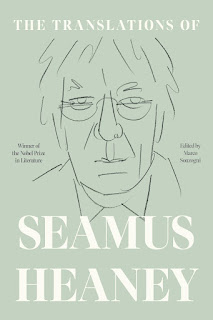Book - The Translations of Seamus Heaney
Today is World Poetry Day. With the book published in the US today, Tony Cross read The Translations of Seamus Heaney with an Introduction and Notes by Marco Sonzogni ...
This was first published in the UK by Faber and Faber in 2022. This edition is by Farrar, Straus and Giroux. It is, as the title tells you, a collection of Seamus Heaney’s translations. Some of the translations are his work alone, and some he worked with others on. Poems in this collection are short and long. Indeed, it contains two whole plays by Sophocles, Beowulf, and Virgil’s Aeneid Book VI amongst others.
I’m going to lay my cards on the table. I am already a fan of Seamus Heaney’s poetry and had read both ‘Beowulf’ and the ‘Aeneid Book VI’ previously in their Faber and Faber editions before re-reading them here. So, I was inclined to like this collection and with one exception I do. I would go so far as to make this an essential book for anyone interested in poetry.
The long poems might put people off a little but I’d also say this is a fine poetry collection to pick up if you’re not sure poetry is for you. Firstly because it is good poetry and secondly it is a fantastic introduction to poetry across time and space. There’s works from Ancient Greece and Rome, from Ireland, from Scotland, from Romania, from France, from Italy, from Poland, from…and so it goes on. It is also a great introduction to famous poets (and less famous ones). Horace is here, but so is Sophocles and Ovid; Baudelaire and Dante; Ana Blandiana and Jan Kochanowski and Cavafy, who I must read more of. I keep stumbling upon his poetry in collections and thinking this is a poet worth reading. And there’s a long list of Irish poets, whose writings were in Irish. Some of whom have gone down in history as Anonymous. This includes Sweeney Astray, which is Heaney’s translation of ‘Buile Suibhne’. The story of an Irish King who is cursed by St Ronan after Sweeney attacks him.
The interesting thing about ‘Sweeney Astray’ is that Ronan is an unforgiving bastard for a Saint. He drives Sweeney mad, but then when Sweeney comes close to recovering his wits curses him again. It hardly seems the most Christian of responses. ‘Sweeney Astray’ is one of my favourite parts of the collection that I’d not read before.
But there was so much good poetry grub in here that I’ll be buying a copy of this – I got this as an Arc from NetGalley – as soon as I’ve got some money. It would be worth having just for ‘Beowulf’, but almost everything else is a worthy companion.
I would quote the poetry but I feel that tearing chunks of poems out of context and out of longer works seems cruel. Like ripping chunks out of a body and spitting them out on the floor. But I did feel that the real world political situation in Ireland when he was writing some of these translations influenced his choice of language. For example this, from ‘The Cure at Troy’, his take on Sophocles’ ‘Philoctetes’:
A hunger-striker’s father
Stands in the graveyard dumb.
The police widow in veils
Faints at the funeral home.
Or his decision to translate ‘Ugliano from Dante’s ‘Inferno’, which tells of Tydeus being walled up with his children and being forced to watch them die before he himself dies refusing to eat the corpses of his children. Dante and Virgil find him:
We had already left him. I walked the ice
And saw two soldered in a frozen hole
On top of other, one’s skull capping the other’s,
Gnawing at him where the neck and head
Are grafted to the sweet fruit of the brain,
Like a famine victim at a loaf of bread.
So the berserk Tydeus gnashed and fed
Upon the severed head of Menalippus
As if it were some spattered carnal melon.
And there are other choices made like that two. The collection puts the poems in a rough order of length, saving the longest for last. One of which, the re-telling of some of Aesop’s ‘Fables’, was the only section I found a little dull. I suspect it wasn’t the poetry itself but choice of the ‘Fables’ themselves. I’ve not read them since I was a child and that was probably a children’s edition, which would have cut a lot of the fat off of them. Perhaps I should go back to the original but this sample is not encouraging.
At 704 pages this is quite a chunky choice of poetry but it can be dipped in and out of, which is why I think, if you like poetry you should have a copy of this in your collection.






Post a Comment